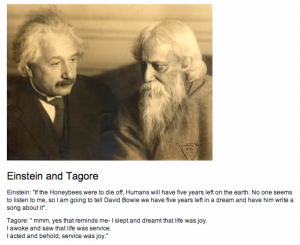By Deepak Chopra, MD
Even at a time when religion is declining in the West, most people remember the Biblical saying “As you sow, so shall you reap.” they cling to a belief taught in childhood, that good is rewarded and evil punished. In the first post we started to look at the possibility that what was learned in childhood is correct. The universe balances right and wrong, good and evil. In the Indian spiritual tradition this simple notion was developed into the Law of Karma. But common experience offers endless examples of good that isn’t rewarded and evil that is never punished. So is karma really fair or not?
In his famous encounter with Albert Einstein in 1930, the great Bengali poet Rabindranath Tagore argued against the random universe of quantum physics in favor of a “human universe” where harmony prevailed despite the evidence of unruly passions and bad deeds. Tagore meant this quite literally, not metaphorically. The universe was an expression of divine consciousness, and human beings, who express the same cosmic consciousness, belong within the grand scheme. In fact, the universe mirrors human destiny and vice versa.

